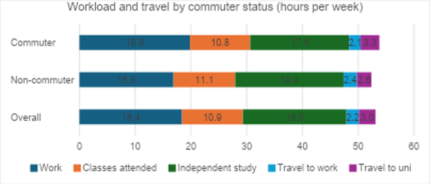When we think about commuter students, the first thing that often comes to mind is the difficulties in balancing their studies with the demands of travel.
We frequently talk about how their lives are more challenging when compared to their peers who live nearer to campus, given the time constraints and added cost pressures they are exposed to.
However, a closer look reveals a fascinating paradox. Despite the perceived hardships, commuter students who progress with their studies can achieve better outcomes.
At the University of Lancashire, our ongoing student working lives (SWL) project, which was set up to understand the prevalence and impact of part-time work on the student experience, has started to shed light on the unique experiences of commuter students.
Our survey considers self-reported responses to questions related to students’ part-time work and university experiences, alongside linked student data to reveal a clearer picture of their non-university lives and their connection with student outcomes.
Initial data from our latest wave of the SWL project suggests that while commuter students frequently experience tighter schedules due to increased travel commitments and other out-of-class responsibilities, they can often experience better outcomes in their university and non-university lives than their non-commuter peers.
This data comes from our 2025 student working lives survey which is based on an institutional sample of 484 students, with permission to link data from 136 students.
Our research extends the recent debate around the choice versus necessity of commuting by repositioning commuters, not as left behind, but as a group of students prepared to meet the challenges laid in front of them, and in some ways, better navigating challenges and excelling in their studies.
Choose Life
The survey’s results reinforce the common belief that commuter students have busy lives.
In combination, commuter students are twice as likely to have caring responsibilities, tend to live in more deprived neighbourhoods (based on IMD quintile) and have a higher work and travel load than their non-commuting counterparts, resulting in less time to spend on study.
However, questions of necessity or choice can imply that university is the most central thing in their lives, challenging whether the assumptions we hold about commuting students have the correct premise.

Looking at our latest research, it tells us that commuters are more likely to spend longer working than non-commuter students. While an increased workload highlights the disadvantage some commuters experience, our findings reveal a more complex picture that requires a deeper dive into the lives of this student demographic.
As such, the commuter students we surveyed achieved higher attainment on average (+2pp) when linking this to university records, despite a lower self-reported rating of belonging compared to their peers.
Put bluntly, while commuting students feel slightly less attachment to the university and commit less time to study, they go on to receive better marks.
While this identifies a positive outcome for those students in our study, we should be mindful of wider research suggesting that commuter students are at greater risk of withdrawing, given the acute nature of the challenge experienced. As the study progresses we’ll continue to track further longitudinal outcomes such as continuation, completion and progression over the coming months and years.
Choose work
In our study, when understanding experiences of work, commuter students reported that they felt their work was more meaningful, more productive and more fairly paid than their non-commuter peers.
They also felt better supported at work by their colleagues and managers and felt their current job requirements and responsibilities would enhance future employment prospects. What can we take from this?
| Student population | Student Working Lives – % Agree | |||||
| Is your work meaningful? | Is your work productive? | Do you feel fairly paid or rewarded? | Do you feel supported by colleagues? | Do you feel supported by managers? | Do you feel your job enhances your future employment prospects? | |
| Commuter | 43.5% | 53.2% | 47.2% | 42.7% | 37.5% | 41.1% |
| Non-Commuter | 40.3% | 39.8% | 44.5% | 38.6% | 31.4% | 30.9% |
It’s important to state that the quality of work outcomes, despite being slightly improved for commuter students, reinforce the findings from our 2024 SWL report and last year’s HEPI Student Academic Experience Survey – students are having to work more to deal with the increased cost of living and on the whole are not experiencing what can be considered as “good” work.
However, commuter students appear to be negotiating their challenges exceptionally well and are more likely to have a job that supports their future career aspirations.
While commuter students face unique challenges, are they effectively leveraging their time and resources to excel in their studies, leading to positive outcomes in various aspects of their lives?
If so, could this add further weight to reframing the argument away from a one-dimensional deficit approach when talking about commuting students?
We already know that commuter students often have busy lives. This fuller life however, with its many facets, could give them the direction and motivation to succeed in their studies and at work.
They are not just students, they are employees, caregivers, and active members of their communities. Rather than being a deficit, these experiences can add to their educational success if they can be supported to leverage their experiences.
Choose commuting
It’s important for universities to recognise this clear paradox around commuter students. Time restrictions and commitments make things harder for commuter students to designate more time to their studies, in particular independent study that infringes on the family home.
The benefits of having more time in the workplace, having a family and traveling can enrich their student experience and outcomes.
By understanding and appreciating these unique experiences, universities can better support commuter and non-commuter students alike.
At the University of Lancashire, we are feeding these insights into our institutional University of the Future programme. This focuses on curriculum transformation to enhance the student learning experience, the transition to block delivery to consider the pace learning aligns with student lives, and the introduction of a short course lifelong learning model that looks to meet the changing needs of students.
Commuter students teach us that life’s challenges can also be its greatest strengths. Their ability to balance multiple responsibilities and still be able to achieve positive outcomes is a testament to their ability and determination, attributes the sector is committed to harnessing and employers are keen on developing in the workplace.
As we continue to explore and understand their experiences in developing our project over the coming months, we can start to challenge assertions and learn valuable lessons that can benefit all students and allow more to “choose life.”
This blog is part of our series on commuter students. Click here to see the other articles in the series.














